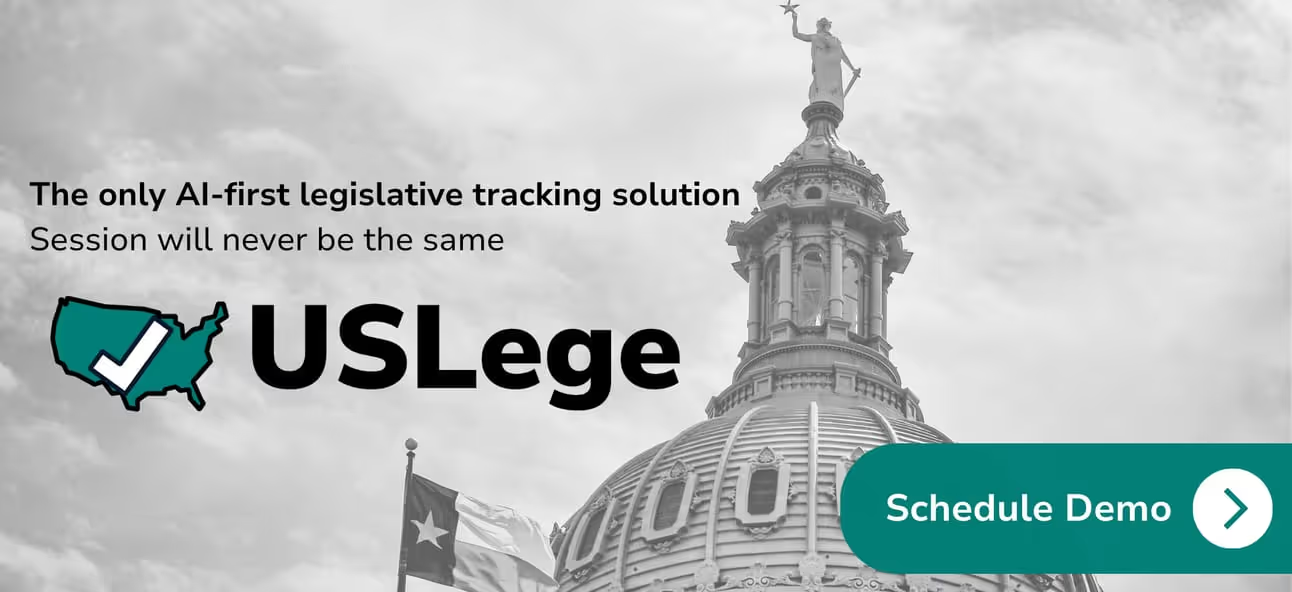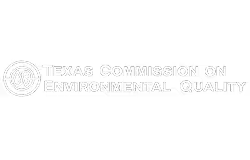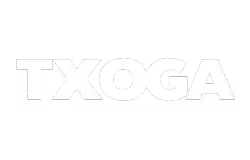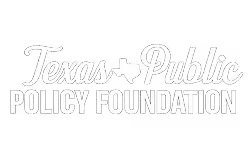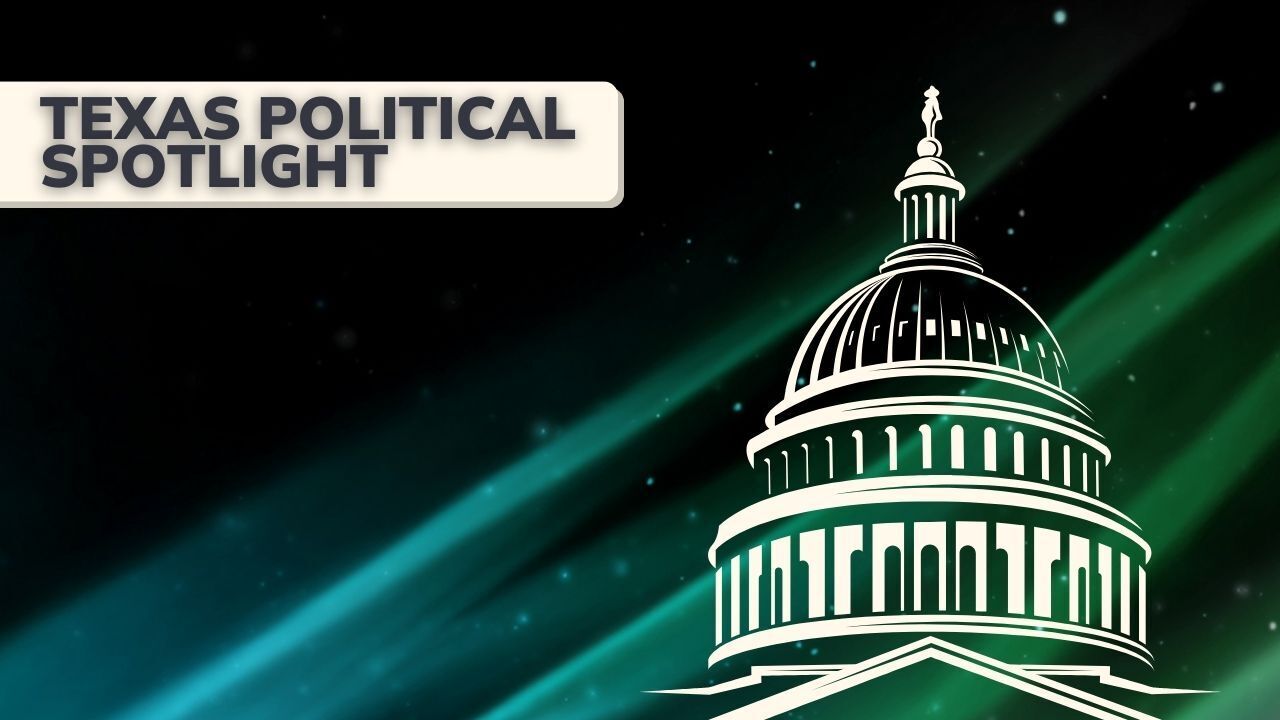
Welcome back, friends
Mexico has agreed to increase water deliveries to the U.S. under the 1944 Water Treaty, addressing a shortfall that has sparked tensions between the two nations. Meanwhile, Texas lawmakers have passed SB 31, the “Life of the Mother Act,” a bill aimed at clarifying abortion laws in life-threatening medical cases. In other news, former Congressman Beto O'Rourke hints at a possible return to politics, leaving the door open for a potential 2026 Senate run.
Today’s Insights:
- Mexico Agrees to Increased Water Deliveries Amid Treaty Shortfall
- SB 31, the “Life of the Mother Act,” Passes Through Texas Senate
- O’Rourke Weighs Return to Texas Politics
Mexico Agrees to Increased Water Deliveries Amid Treaty Shortfall
On Monday, the U.S. State Department announced that Mexico has agreed to deliver up to 420,000 acre-feet of water to the United States by October as part of its obligations under the 1944 U.S.-Mexico Water Treaty. The agreement comes amid rising tensions over Mexico's shortfall in water deliveries during the current five-year cycle, which ends this fall. As of now, Mexico has delivered less than 600,000 acre-feet of the required 1.75 million acre-feet, and even with the new deliveries, it would still fall short of the treaty’s target by over 800,000 acre-feet. The new deal also includes an immediate transfer of 56,750 acre-feet from the jointly operated Amistad Reservoir and sets up monthly deliveries from both Amistad and Falcon reservoirs.
U.S. Representative Monica De La Cruz shared further details of the agreement on Tuesday:
The agreement expands U.S. access to water from six treaty-managed tributaries, increasing the American share from one-third to one-half, and includes additional water from the Río San Juan, an unregulated source under the treaty. A follow-up meeting between both nations is scheduled for July to evaluate progress and hydrological conditions. Senator John Cornyn also publicly welcomed the agreement, stating:
“South Texas has been devastated by Mexico’s repeated refusal to deliver the water it has owed the United States for far too long, and I commend the Trump administration for securing this critical deal for Mexico to finally send water to the region.”
“This new agreement will bring substantial amounts of acre-feet of water to the U.S., and I thank President Trump, Secretary Rubio, Secretary Rollins, and Deputy Secretary Landau for their leadership after years of the Biden administration sitting on its hands and letting Texans suffer.”
SB 31, the “Life of the Mother Act,” Passes Through Texas Senate
The Texas Senate on Tuesday afternoon unanimously approved SB 31, which seeks to clarify the state’s abortion laws in cases where a pregnant patient’s life is at risk. The bill, authored by Sen. Bryan Hughes, expressly permits doctors to perform abortions legally in life-threatening situations and aims to ensure that physicians no longer have to wait until medical situation becomes a crisis. The bill also mandates training for doctors and lawyers on the nuances of the law.
SB 31 was first introduced earlier this session in response to widespread concern from the medical community that the current legal framework is too vague, forcing delays in care due to fear of legal repercussions. The bill aligns language across Texas’ three existing abortion bans, including the state’s 19th-century criminal statute. After negotiations among anti-abortion organizations, medical associations, and lawmakers from both parties, the bill now heads to the Texas House, where a similar measure, HB 44, is moving through committee.
O’Rourke Weighs Return to Texas Politics
Former U.S. Representative Beto O’Rourke said he has not ruled out a future run for office during a town hall event held Saturday at Anderson’s Eatery & Distillery in Denton. When asked if he would run for U.S. Senate in 2026, O’Rourke responded that his current focus remains on his voter mobilization organization, Powered By People, but added:
"If it comes to pass, that this is what the people of Texas want, that it's the highest and best use of what I can give to you, then yes, I will."
O’Rourke, who previously represented Texas’ 16th congressional district from 2013 to 2019, has launched three high-profile campaigns: one for U.S. Senate in 2018, a president bid in 2020, and a run for governor in 2022, all of which were unsuccessful.
We hope you enjoyed today’s read!
🎙️We Have a Podcast! 🎙️
Bills and Business is your go-to podcast for conversations related to Texas legislation and business. Hosted by Laura Carr, Co-Founder of USLege—an AI-driven legislative tracking software—we bring you in-depth analysis on economic trends, impactful legislation, and key developments shaping Texas business.
Subscribe on Youtube and Spotify for weekly episodes!

- 01 First
Subscribe to our Newsletter

Read more news

How Government Affairs Teams Use Legislative Tracking Software to Stay Ahead of Policy Changes
Policy professionals are expected to stay ahead of policy changes while managing constant updates across multiple jurisdictions.
Relying on manual methods makes it difficult to keep pace with how quickly bills move through the legislative process.
Government affairs teams face pressure to track legislation across Congress, states, and local bodies.
A single bill can change direction after committee hearings or amendments, leaving little time to respond.
When updates are missed, advocacy efforts, compliance planning, and stakeholder trust can suffer.
Many organizations still depend on email alerts, spreadsheets, and fragmented search tools.
These approaches lack structure and often fail to surface relevant updates at the right moment.
As regulations grow and legislative calendars tighten, teams need better visibility and control.
Legislative tracking software provides a centralized way to monitor bills, receive real-time alerts, and analyze legislative and regulatory data. Instead of reacting late, teams can anticipate developments, stay informed, and make informed decisions with confidence.
This article explains what legislative tracking is, why it matters, how teams use it, and how organizations can stay ahead of policy changes with structured tracking.
What Is Legislative Tracking Software?
Legislative tracking software is a system designed to track bills, monitor legislation, and organize legislative and regulatory data in one place.
It transforms raw information into usable insights that support analysis, reporting, and strategy.
Instead of scattered sources, users access legislation, regulations, and related data through one platform using legislative tracking software.
This structure allows policy professionals to quickly understand how changes affect priorities and stakeholders.
How It Supports Bill Tracking
Bill tracking involves following a bill from introduction through hearings, amendments, votes, and outcomes.
Tracking software allows teams to track bills across jurisdictions while maintaining a clear timeline of activity.
Centralized Legislative Data Access
With a centralized database, users gain consistent access to bills, committee assignments, and regulatory updates.
This reduces duplication and improves focus across the organization.
Why Legislative Tracking Has Become Mission Critical
Growing Legislative Volume
Each legislative session introduces thousands of bills at the federal level and state levels.
Manual review becomes impractical as volume increases.
Shorter Response Windows
Bills often move quickly from introduction to committee hearings.
Real-time alerts help teams stay ahead of deadlines and never miss key moments.
Increased Regulatory Risk
Missed policy changes can result in compliance gaps, legal exposure, and reputational harm.
Regulatory tracking helps reduce risk by improving awareness and timing.
How Government Affairs Teams Use Legislative Tracking Software
Monitoring Bills Across Jurisdictions
Government relations teams often manage activity across multiple jurisdictions.
Legislative tracking provides coverage at the federal, state, and local levels without creating silos.
Identifying Policy Impact Early
AI-powered insights surface relevant bills and policy developments before they reach critical stages.
Early analysis allows teams to anticipate impact and prepare responses.
Supporting Advocacy and Lobbying Efforts
Advocacy depends on timing and context. Real-time alerts notify teams of hearings, amendments, and votes so advocacy strategy aligns with legislative movement.
Role of Real-Time Alerts in Policy Monitoring
Alert Types That Matter
Alerts notify teams about bill movement, committee hearings, amendments, and executive orders.
These alerts reduce manual search and support faster response.
Email Alerts and Workflow Control
Email alerts deliver critical information directly to policy professionals.
Combined with dashboards, alerts help teams stay informed without overload.
Core Features That Matter Most
Advanced Search and Filtering
Search tools allow users to filter bills by keyword, sponsor, committee, jurisdiction, or date.
This ensures relevant results and better focus.
Bill Summaries and Ongoing Analysis
Bill summaries translate legislative language into plain terms.
Ongoing analysis highlights how each bill changes over time.
Reporting and Team Collaboration
Advanced reporting supports internal briefings and leadership updates.
Team collaboration improves when insights and reports are shared centrally.
Legislative Tracking vs Manual Monitoring
Manual tracking relies on constant review and fragmented tools.
Tracking software improves accuracy, speed, and coverage.
Who Benefits Most From Legislative Tracking Software?
Government Affairs Teams
Government affairs professionals use legislative tracking to manage advocacy, policy monitoring, and stakeholder communication.
Compliance and Policy Professionals
Regulatory tracking supports compliance teams by monitoring regulations and legislative changes that affect obligations.
Public Policy Managers and Analysts
A public policy manager relies on tracking tools for analysis, reporting, and informed decisions.
Best Practices for Implementing Legislative Tracking
Define Priorities Early
Teams should identify key issues, jurisdictions, and stakeholders before enabling alerts.
Align Tracking With Strategy
Legislative tracking should support a broader policy and advocacy strategy.
Review and Refine Regularly
Regular review ensures alerts and search criteria remain relevant as priorities shift.
Managing Information Overload
Filtering for Relevant Data
Strong filtering and AI-powered insights reduce noise and surface critical information.
Using Summaries to Quickly Understand
Bill summaries help teams quickly understand changes without reviewing the full legislative text.
Supporting Advocacy With Better Data
Data Driven Advocacy Strategy
Advocacy benefits from accurate data, clear analysis, and timely alerts.
Sharing Insights With Stakeholders
Teams can share updates and reports with stakeholders to maintain transparency and trust.
Security and Data Integrity
Protecting Sensitive Information
Tracking platforms prioritize security to protect legislative data and internal strategy.
Controlled Access and Permissions
Access controls ensure only authorized team members can assign tasks or generate reports.
Legislative Coverage Across Jurisdictions
Federal, State, and Local Coverage
Tracking tools provide coverage across jurisdictions to avoid blind spots.
Comprehensive Coverage Without Duplication
Teams maintain visibility without overlapping effort.
Reporting That Supports Leadership
Custom Reports for Briefings
Custom reports help leadership review policy impact quickly.
Advanced Reporting for Long-Term Strategy
Reports support long-term planning and organizational review.
Staying Ahead of Policy Changes
Anticipating Legislative Trends
Legislative tracking allows teams to anticipate change rather than react late.
Never Miss Critical Updates
Real-time alerts ensure teams never miss hearings, amendments, or votes.

Why Governors’ Offices Need Modern Legislative Technology to Keep Up
Governors are expected to move quickly, stay aligned with their legislatures, anticipate risk, and make high-stakes decisions. At the same time, legislative activity is accelerating, policy language is constantly shifting, and critical conversations are happening in more rooms than any one team can cover.
From our perspective, one thing Governor Hochul articulated so clearly is this: modern governance requires modern tools.
Below are five reasons governors’ offices need modern legislative technology to keep up, grounded in the realities discussed at the event and informed by the lived experience that led to the creation of USLege.
1. Speed Is No Longer Optional for Governors’ Offices
Governor Hochul spoke repeatedly about urgency. Whether the issue is immigration, energy policy, budgets, or federal action, governors are expected to respond in real time. Legislative timelines do not pause, and waiting for end-of-day summaries or secondhand updates is no longer sufficient.
For governors’ offices, speed is not about reacting publicly faster. It is about knowing what is happening inside the legislature the moment it happens.
Modern legislative technology makes that possible by providing live and archived legislative video, searchable transcripts, and real-time alerts tied to executive priorities. Instead of learning about developments after the fact, governors’ offices gain immediate visibility and can engage while there is still time to shape outcomes.
.avif)
2. Governing Now Means Managing Many Crises at Once
During the conversation, Governor Hochul moved rapidly between topics that, on their own, would consume most executive agendas: immigration enforcement, climate mandates, budget negotiations, federal funding uncertainty, and electoral dynamics. The speed at which she shifted was not rhetorical. It reflected the reality of governing today.
Multiple high-stakes issues are live at the same time, often moving on different timelines and through different parts of the legislature. Governors are expected to track all of them simultaneously and make decisions with confidence, even when developments are unfolding in parallel.
This creates a structural challenge for governors’ offices. Critical information is being generated across committees, hearings, and negotiations at the same time. No single team can manually monitor it all, yet missing a development in any one area can have real policy or political consequences.
Modern legislative technology helps governors’ offices manage this complexity by monitoring legislative activity continuously and surfacing the moments that intersect with executive priorities. It ensures leadership teams are not choosing which issue to see, but instead have visibility into all of them — as they happen.
.avif)
3. Institutional Knowledge Is Critical and Increasingly Fragile
Governor Hochul emphasized the importance of understanding the levers of government. That insight applies just as strongly to governors’ offices as it does to elected leadership.
Institutional knowledge is what allows staff to distinguish noise from risk, anticipate reactions, and advise governors with confidence. But that knowledge is increasingly fragile. Staff turnover, compressed timelines, and information overload mean teams spend more time capturing information than interpreting it.
Taking notes has quietly become the job.
Modern legislative technology restores balance by preserving institutional knowledge at scale. Searchable video libraries, historical transcripts, and AI-powered summaries allow offices to retain context over time. New staff ramp faster. Experienced staff spend less time transcribing and more time thinking strategically.
Technology does not replace judgment. It protects it.
.avif)
4. Policy Risk Often Hides in Amendments and Language Changes
Another reality discussed at the event is how fluid policy really is. Bills evolve. Language shifts. Provisions are revived through amendments after appearing to be settled.
Traditional bill tracking relies heavily on keywords. But keywords miss intent, and intent is where risk lives.
Governors’ offices need visibility into how legislation is changing, not just whether a keyword appears. AI-driven legislative intelligence makes it possible to track meaning across drafts, flag material changes, and surface provisions that introduce new risk or opportunity.
This is especially critical during budget negotiations and end-of-session periods, when seemingly minor language changes can carry significant policy and political consequences.
.avif)
5. Confidence Comes From Context, Not Guesswork
Governors are expected to make decisions with confidence, even when timelines are tight and information is incomplete. That confidence does not come from more data. It comes from having the right information, with context, at the moment it is needed.
Modern legislative platforms reduce noise, prioritize relevance, and connect executive teams directly to original source material. Instead of relying on summaries filtered through multiple layers, governors’ offices can see, hear, and understand legislative developments firsthand.
When leadership teams trust their visibility into the legislature, they spend less time managing surprises and more time leading.
.avif)
The Bottom Line for Governors’ Offices Nationwide
The challenges discussed at Capitol Confidential Pro were not New York-specific. They reflect the reality of governing in every state today.
Modern legislative technology is no longer a nice-to-have. It is the foundational infrastructure for effective executive leadership.
USLege was built by people who have done this work inside legislatures, governors’ offices, and policy roles. Every feature maps to a real failure point that professionals have lived through.
For governors’ offices across the country, staying informed, aligned, and ahead now depends on tools designed for the pace and complexity of modern government.

How State Legislative Tracking Software Helps Teams Anticipate Policy Changes Faster
Each year, state legislators across the country consider more than 170,000 bills, but only about 30,000 become law. To keep up with this vast volume, organizations need comprehensive coverage that spans all 50 states and the federal level, ensuring no critical legislative activity is missed anywhere in the country.
But how can teams effectively monitor and anticipate these shifts before they impact their strategies? The answer lies in state legislative tracking software. This powerful tool centralizes and automates critical information, enabling teams to track legislative and regulatory activities, providing real-time updates, and offering more than just identification of bills by delivering context and counsel on what to do with that information.
This article will explore how state legislative tracking software works, its key features, and the benefits it offers to teams involved in government affairs and public policy. As of 2026, these platforms increasingly leverage artificial intelligence and machine learning to manage the growing volume and complexity of state-level policy, including providing personalized bill summaries and detecting bill topics.
By leveraging these tools, teams can stay ahead of the curve and anticipate policy changes faster, ensuring their strategies are always proactive rather than reactive.
Understanding State Legislative Tracking Software
State legislative tracking software is a specialized tool designed to help organizations monitor and track legislative activities at the state level. These services assist clients by tracking legislation and providing access to a centralized database for monitoring legislative activity, ensuring they stay informed and equipped to respond to changes across multiple states.
Whether you’re a government affairs professional, public affairs team, or compliance officer, having access to real-time alerts and comprehensive legislative data is crucial for staying informed about pending bills, amendments, and other key changes.
Key Features of State Legislative Tracking Software
- Real-Time Bill Alerts: This feature sends instant notifications, including email alerts, when a bill progresses, gets amended, or is scheduled for a vote. Alerts can be customized to track specific bills, legislative committees, or key issues.
- Bill Progress Tracking: From introduction to passage, tracking software allows you to follow each bill’s journey through the legislative process, keeping you up to date with every step.
- Data Analytics & Reporting: These tools provide in-depth analysis and customizable reports to track trends and legislative activity across multiple jurisdictions, saving time on manual research.
- Collaboration Tools: Many platforms integrate with team collaboration tools, enabling real-time sharing of legislative data and fostering collaboration across departments such as compliance, legal, and public affairs teams.
- New Tools: Recent innovations in legislative tracking software introduce new tools that enhance efficiency, accessibility, and engagement, making it easier for users to manage and respond to legislative developments.
- AI-Enhanced Features: Many legislative tracking software solutions utilize AI to enhance their features and capabilities, providing smarter insights and automation.
- Customized Updates: Users can receive customized, real-time legislative updates through secure web portals or mobile apps, ensuring timely and secure access to critical information.
With state legislative tracking software, organizations gain unparalleled visibility into state legislatures, enabling them to engage with the legislative process more effectively.
How State Legislative Tracking Software Works
State legislative tracking software functions by providing access to real-time updates on state-level legislation. Unlike services that only deliver raw data, this software offers analysis and context to help users understand the implications of legislative developments.
By tracking bills, committee hearings, amendments, and votes, the software helps teams review legislative information and interpret rules relevant to their organization, ensuring they stay ahead of potential legislative changes that could affect their operations. Dedicated analysts can also provide tailored insights and alerts based on users' specific legislative interests.
Key Functions and Uses:
- Real-Time Bill Alerts: When a bill is introduced, amended, or passed, the software sends notifications to the team. These alerts help teams stay on top of pending bills that could directly impact their organization’s goals, industry regulations, or compliance obligations.
- Tracking Bill Progress: Users can track the journey of individual bills, from introduction to committee reviews and votes, to eventual passage. This level of detail is crucial for government affairs professionals who need to anticipate the passage of priority bills and adjust their strategies accordingly. Legislative tracking tools allow users to know exactly where a bill is in the process, which can vary among the 50 states.
- Predictive Analytics: Some tracking software uses AI-powered analysis to predict future legislative trends based on past bill activity. This feature can help teams anticipate regulatory activity and prepare for potential changes in the regulatory landscape.
- Integration with Team Tools: Many software solutions integrate seamlessly with project management and reporting tools, allowing teams to incorporate legislative data into their workflow. This integration ensures that teams can track key bills, share critical insights, and align their strategies across departments, while automating or simplifying tasks related to legislative monitoring and compliance.
By streamlining bill tracking and providing access to regulatory intelligence, state legislative tracking software empowers teams to monitor and engage with state-level legislation more effectively, making it easier to stay ahead of potential policy shifts.
Key Features of State Legislative Tracking Software
State legislative tracking software offers a variety of features that improve the speed and accuracy with which organizations can track and respond to legislative changes. Public affairs professionals rely on these tools to automate their monitoring of state legislative developments. These tools are designed to help teams stay informed about the regulatory and legislative process at every stage.
1. Real-Time Bill Alerts
One of the primary features of state legislative tracking software is the ability to receive real-time alerts about changes in legislative bills. These alerts can include notifications when a bill moves from one stage to the next, is amended, or is scheduled for a vote. These real-time alerts ensure that teams stay up to date and can act quickly when necessary.
2. Bill Progress Tracking
Tracking the progress of individual bills is essential for teams involved in policy advocacy or regulatory compliance. State legislative tracking software allows users to monitor bills throughout their legislative journey, from introduction to committee hearings, debates, and votes. This progress tracking helps organizations focus their resources on priority bills that are most relevant to their objectives, and with AI comparison tools, teams can gain insight into trends in policy positioning and predict the likelihood of a bill passing.
3. Automated Reporting
State legislative tracking software can generate customized reports based on specific search criteria. For instance, reports can be generated based on committee assignments, bill sponsors, or regions of interest. These automated reports save time by eliminating the need for manual tracking and provide teams with valuable insights into legislative trends.
4. Search and Filter Options
With the ability to search and filter bills by key topics, legislative committees, or sponsors, users can quickly narrow down their focus to the most relevant legislation—including bills and legislative activity in Congress. Custom searches allow teams to track priority bills related to specific industries or areas of interest, providing better-targeted insights into state and federal legislation.
Government Affairs and Legislative Tracking
For government affairs professionals, effective legislative tracking is the cornerstone of successful advocacy and policy management. Navigating the legislative process requires constant vigilance, as new bills and regulatory activity can emerge rapidly across multiple states. By leveraging advanced bill tracking tools, these professionals can monitor pending bills, track legislative developments, and stay informed about the issues that matter most to their organization.
With comprehensive legislative tracking, government affairs teams can focus their efforts on high-priority bills and regulatory changes, ensuring that their strategies are aligned with the latest developments. This targeted approach allows them to allocate resources efficiently, respond quickly to emerging challenges, and maintain compliance with evolving regulations.
Bill tracking software also empowers government affairs professionals to build and strengthen relationships with state legislators. By staying up to date on the legislative process and understanding the priorities of key lawmakers, teams can engage more effectively and advocate for their organization’s interests at every stage.
Ultimately, legislative tracking enables government affairs professionals to work smarter, not harder. By gaining insight into the legislative landscape across multiple states, they can anticipate policy shifts, support their colleagues and stakeholders, and make informed decisions that drive organizational success.
The Impact of State Legislative Tracking Software on Decision-Making
State legislative tracking software plays a critical role in improving decision-making by providing real-time data, enhancing collaboration, and helping teams make informed strategic decisions. By tracking legislation, organizations receive early notice of upcoming hearings, enabling them to prepare testimony or mobilize supporters proactively.
1. Improved Policy Decision-Making
Having access to up-to-date legislative information enables teams to make better policy decisions. For example, government affairs professionals can adjust their advocacy strategies based on the latest legislative developments. If a priority bill is being debated in committee, teams can quickly analyze the bill’s potential impact and advocate for changes if necessary.
2. Enhanced Collaboration Across Teams
By sharing legislative data in real time, teams can collaborate more effectively. Whether it’s the legal team reviewing compliance issues or the public affairs team crafting a strategy to influence a bill’s outcome, having access to real-time updates ensures that everyone is aligned and working from the same data. This cross-department collaboration fosters quicker responses to legislative changes.
Real-World Applications of State Legislative Tracking Software
Example 1: Healthcare Organizations
Healthcare organizations use state legislative tracking software to stay on top of changes to healthcare-related laws. For example, if a state introduces a bill that could affect insurance coverage or Medicaid requirements, the software helps teams monitor the bill’s progress and respond quickly with advocacy efforts or compliance adjustments. In addition to tracking bills, healthcare organizations also use the software to monitor executive orders that may impact healthcare policy and compliance.
Example 2: Political Action Committees (PACs)
Political action committees and advocacy groups also benefit from using legislative tracking tools. These groups can track bills related to their issues, identify critical votes, and mobilize support or opposition accordingly. For public affairs professionals working on national issues, multistate tracking is essential, as state actions can have significant effects across the country. Regulatory tracking software helps these groups stay ahead of legislative developments and influence the policymaking process.

Texas Political Spotlight

Welcome back, friends
A crowded Republican primary to replace U.S. Rep. Chip Roy is taking shape as former MLB star Mark Teixeira pours millions into his campaign and secures endorsements from President Trump and Gov. Abbott, positioning himself as the early frontrunner in a race that will likely decide the next representative for the solidly red district. At the same time, federal regulators have launched an inquiry into ABC’s The View after it interviewed Texas Senate candidate James Talarico. Meanwhile, Attorney General Ken Paxton is suing a Bastrop rendering plant over emissions described by residents as overwhelming and harmful, escalating a high-profile environmental dispute that has drawn hundreds of complaints and could result in significant penalties for the company.
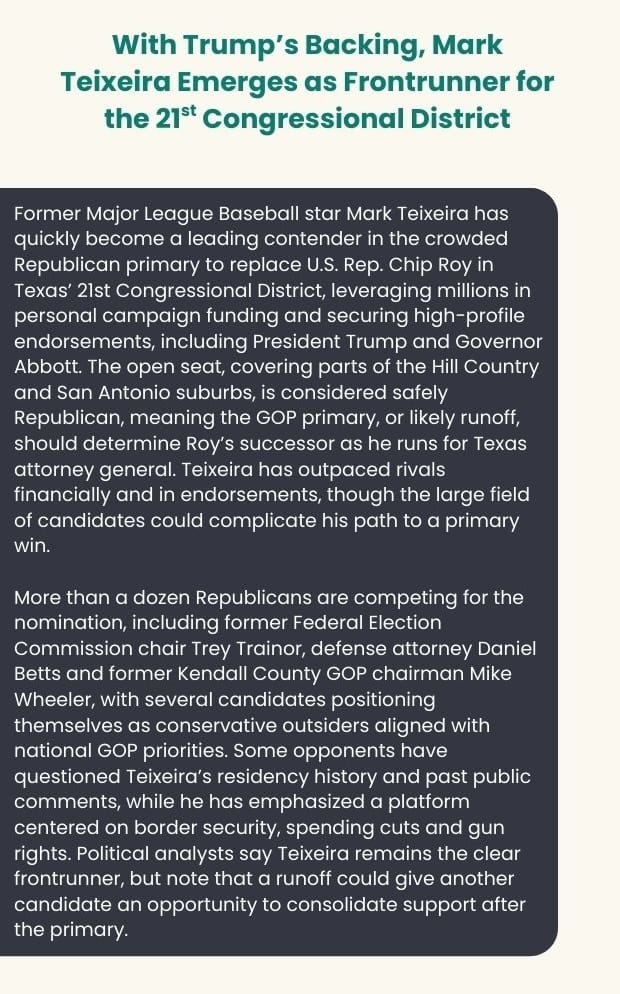
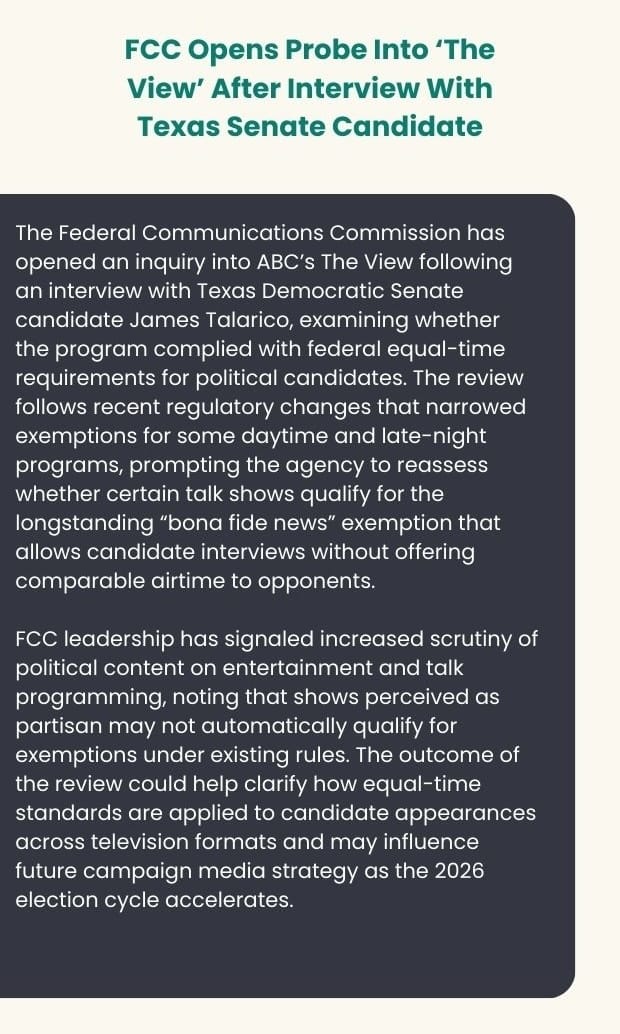
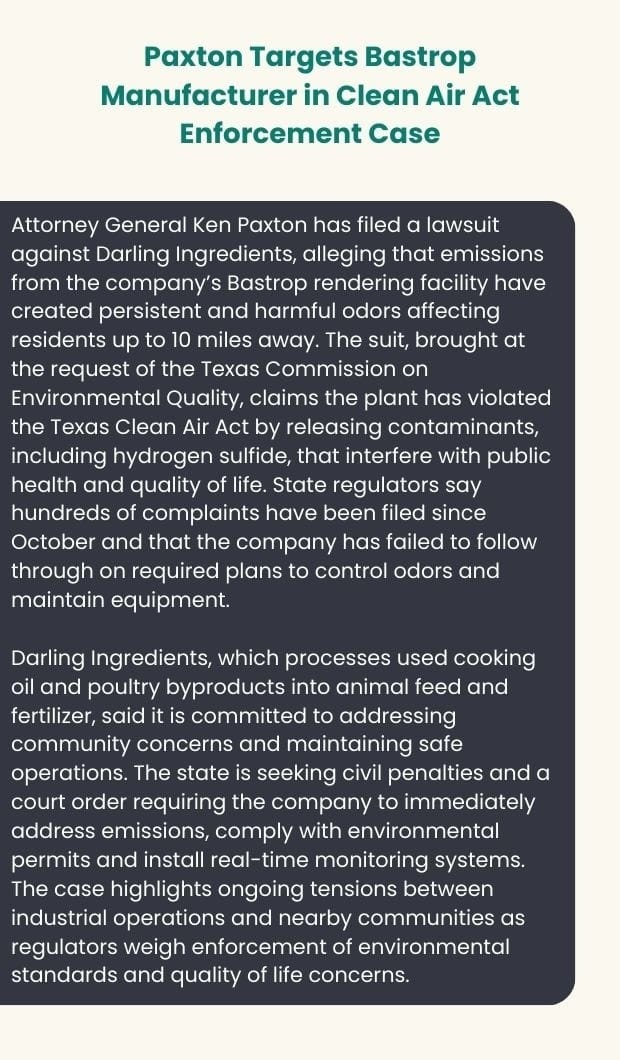
We hope you enjoyed today’s read!

Texas Political Spotlight

Welcome back, friends,
Gov. Greg Abbott has ordered a statewide freeze on new H-1B visa applications at Texas public universities and state agencies. In the Democratic race for lieutenant governor, steelworkers union leader Marcos Vélez is gaining traction with major labor backing and fresh scrutiny over fundraising ties linked to Texas Majority PAC as the primary nears. Lastly, Abbott says the White House is developing a plan to “recalibrate” ICE enforcement after fallout in Minnesota, as Texas simultaneously weighs billions more for Operation Lone Star and its ongoing border strategy.
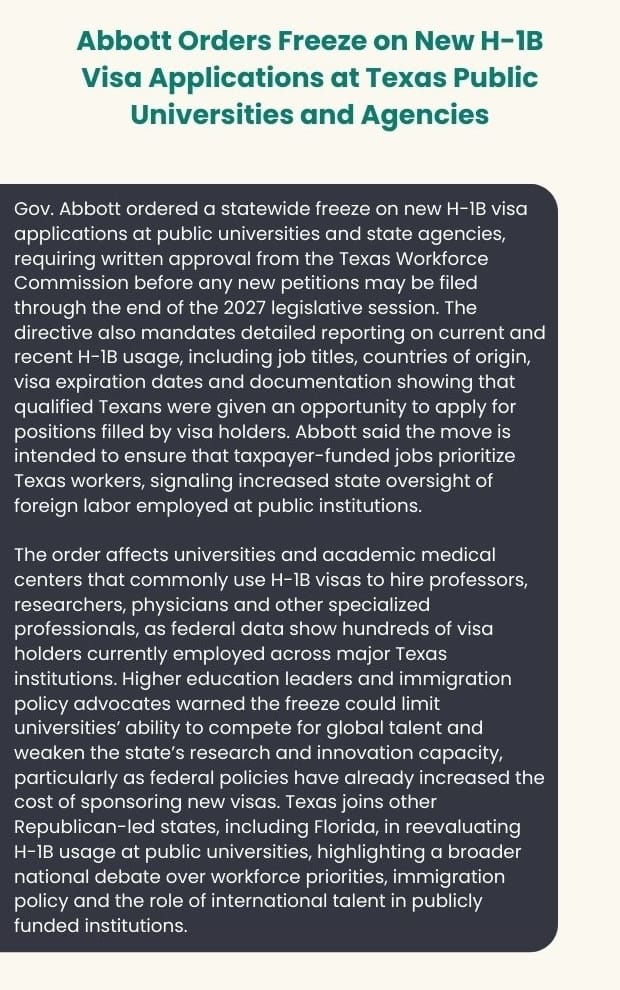

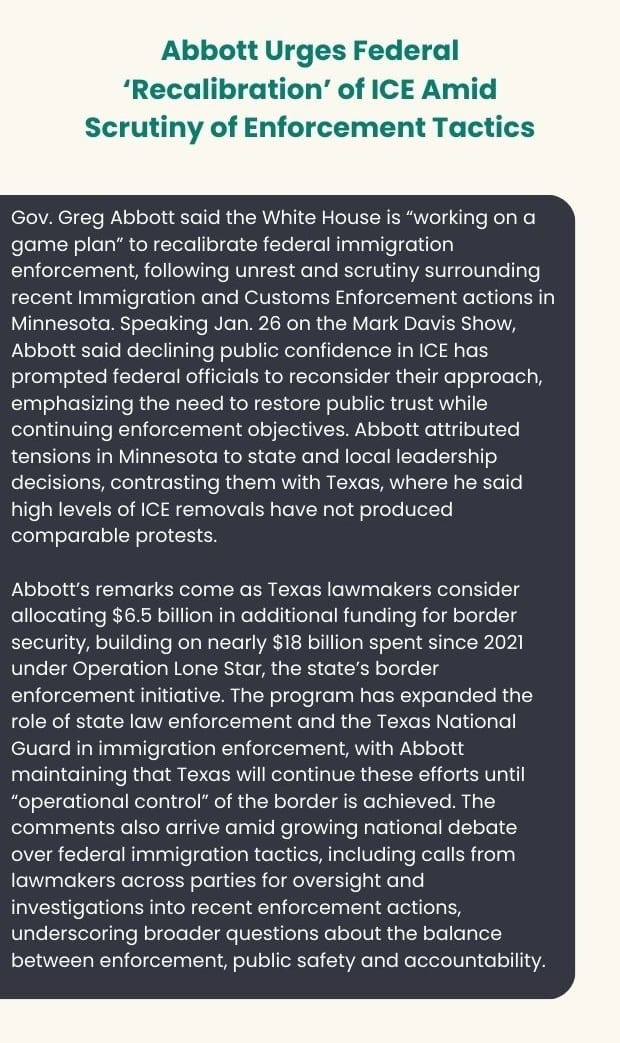
We hope you enjoyed today’s read!
Stay connected with TXLege News on X and LinkedIn!


Texas Political Spotlight

Welcome back, friends
Texas is facing a pivotal legal test over its election system as Republicans seek to end open primaries, a move that supporters frame as protecting party autonomy and critics warn could create new barriers to voter participation. At the same time, federal officials are considering a land exchange that would allow SpaceX to expand its South Texas launch site, renewing debate over how to balance economic growth with the preservation of sensitive wildlife habitat along the Gulf Coast. Lastly, a federal judge has blocked a new Texas law regulating children’s access to app stores, underscoring the ongoing uncertainty over how far states can go in policing online safety without infringing on constitutional rights.
.jpeg)
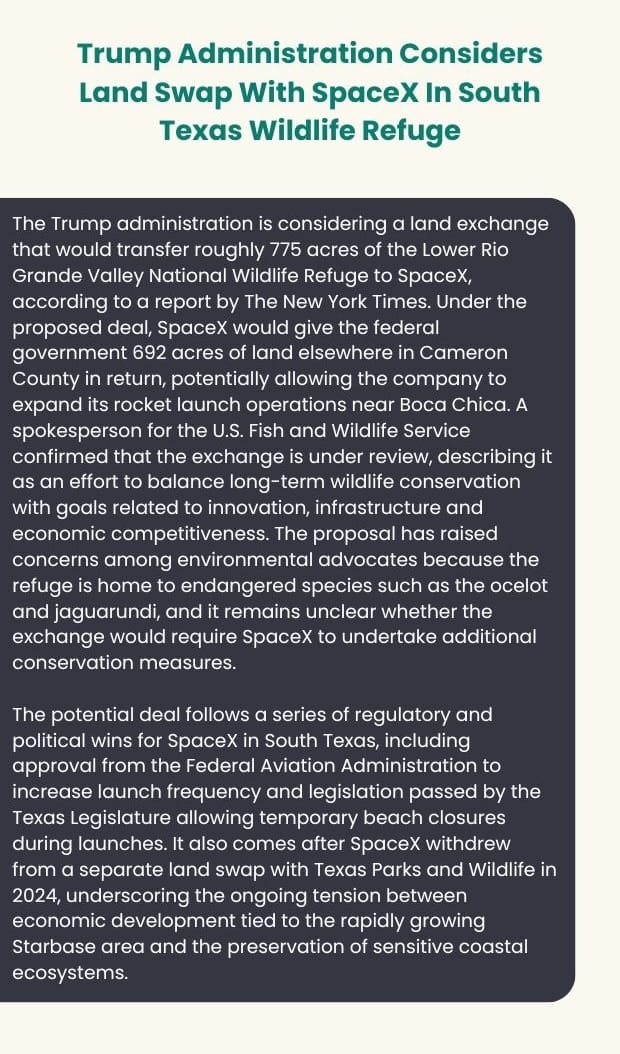
.jpeg)
We hope you enjoyed today’s read!


